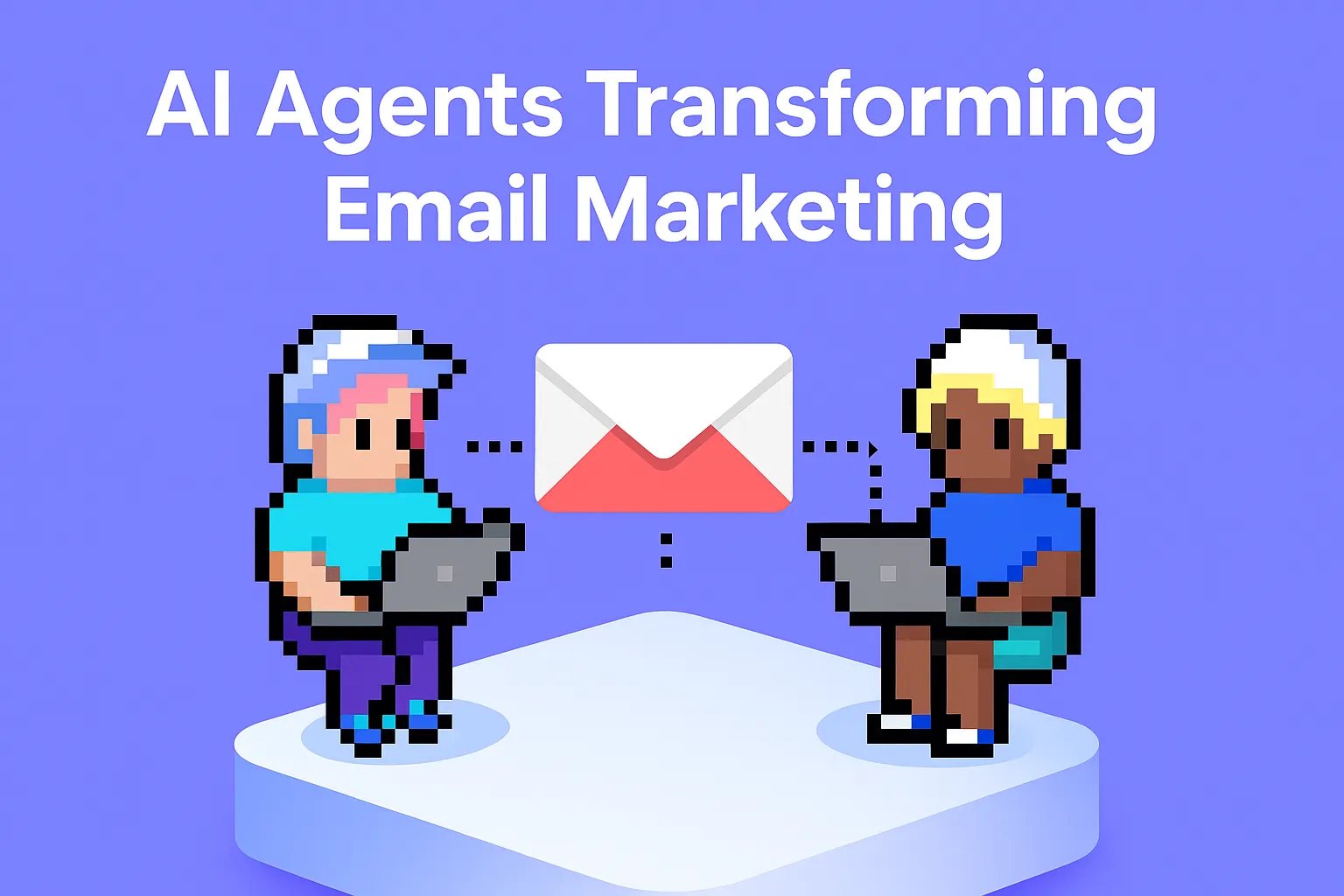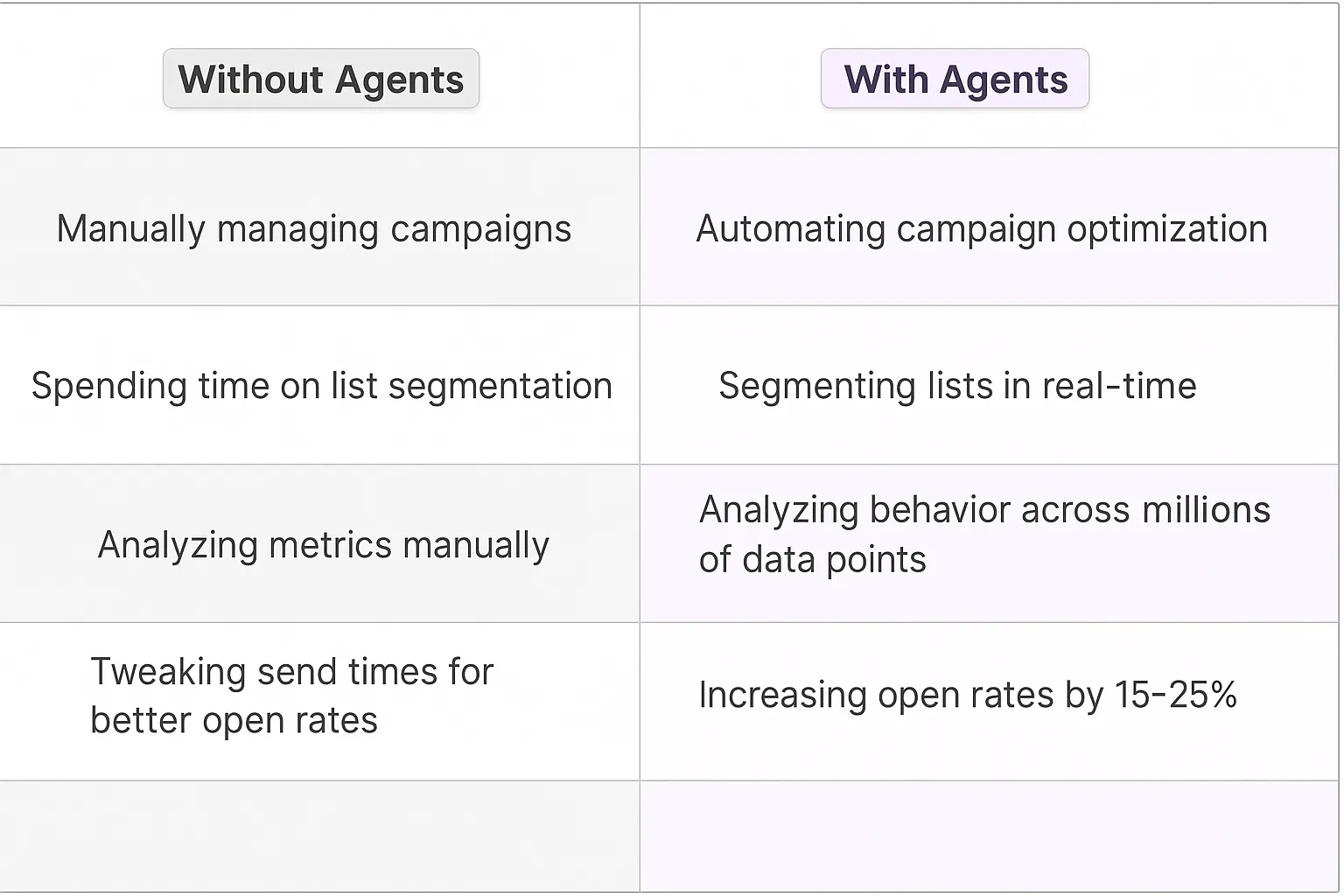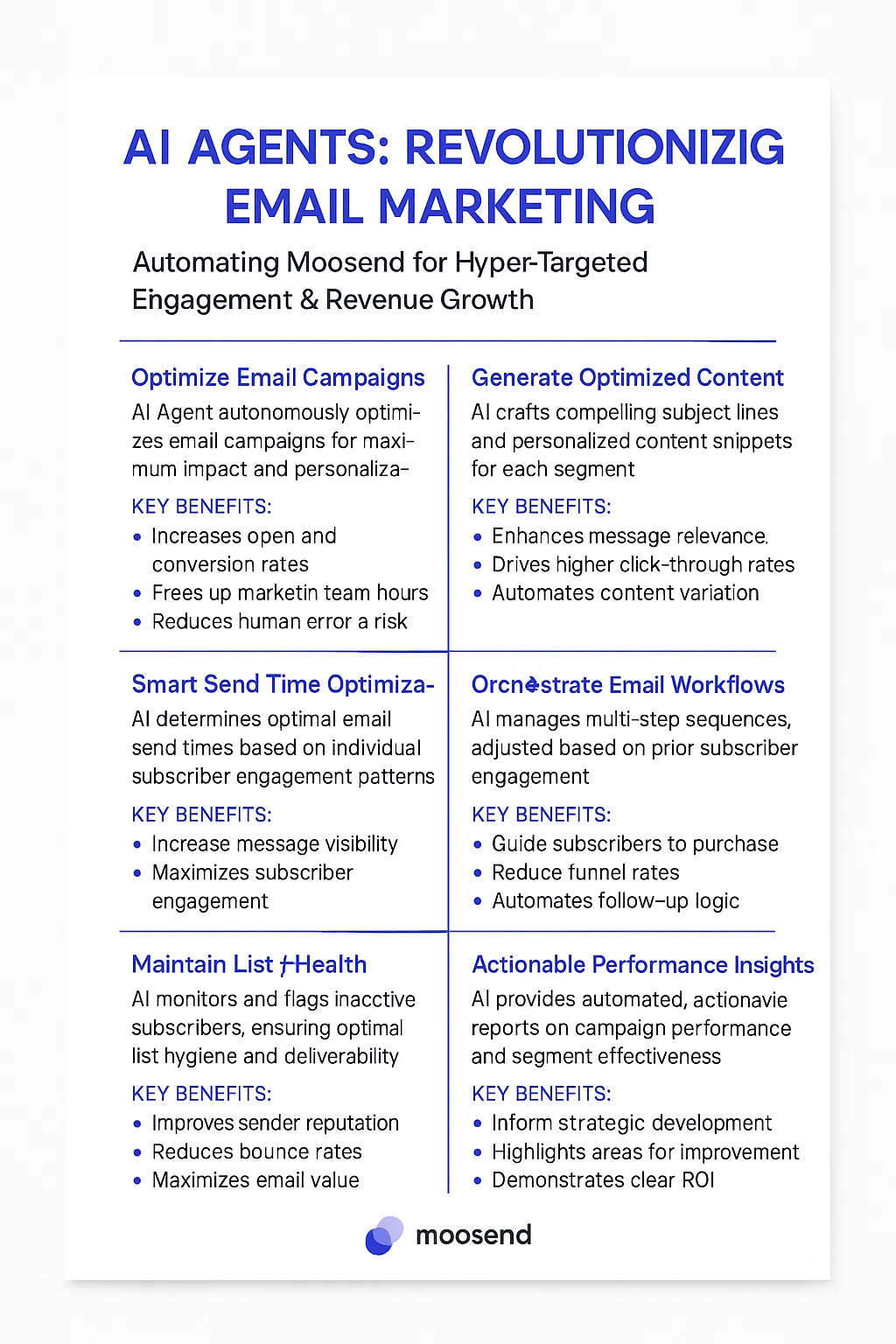Moosend
Understanding Moosend's Email Marketing Platform
Moosend stands as a sophisticated email marketing platform that combines powerful automation capabilities with user-friendly design tools. The platform enables businesses to create, send, and analyze email campaigns while managing subscriber lists and tracking engagement metrics. With its robust API and integration options, Moosend serves as a central hub for email marketing operations across various industries.
Key Features of Moosend
The platform offers advanced segmentation tools, drag-and-drop email builders, and comprehensive analytics dashboards. Its automation workflows allow for complex trigger-based campaigns, while A/B testing capabilities enable data-driven optimization. The platform's landing page builder and form creation tools complete a full suite of marketing features designed for growth-focused teams.

Benefits of AI Agents for Moosend
What would have been used before AI Agents?
Marketing teams traditionally relied on manual email campaign management in Moosend, requiring constant attention to list segmentation, content creation, and campaign optimization. They spent countless hours analyzing metrics, tweaking subject lines, and adjusting send times - tasks that pulled them away from strategic thinking and creative work.
The standard approach involved multiple team members coordinating through spreadsheets, maintaining complex documentation of email templates, and making educated guesses about audience preferences. This created bottlenecks in workflow and limited the sophistication of email marketing efforts.
What are the benefits of AI Agents?
AI Agents transform Moosend email marketing by handling the heavy lifting of campaign optimization. They analyze subscriber behavior patterns across millions of data points to determine optimal send times, increasing open rates by 15-25% on average.
These digital teammates excel at real-time list segmentation, automatically categorizing subscribers based on engagement levels, purchase history, and behavioral signals. This granular segmentation enables hyper-targeted campaigns that consistently outperform broad-based approaches.
The AI's ability to generate and test multiple subject line variations simultaneously leads to significant improvements in email performance. Rather than relying on gut instinct, marketing teams can leverage data-driven insights to craft messages that resonate with specific audience segments.
A key advantage is the AI's capacity to learn from each campaign's performance, continuously refining its understanding of what works for different subscriber groups. This creates a compound effect where email marketing effectiveness increases over time without requiring additional human input.
For e-commerce businesses using Moosend, AI Agents can automatically trigger personalized product recommendations based on browsing behavior and purchase history, driving higher conversion rates through relevant, timely communications.

Potential Use Cases of AI Agents with Moosend
Processes
Email marketing teams can deploy AI agents to manage complex Moosend workflows that typically require constant manual oversight. The agents excel at monitoring campaign performance metrics, adjusting send times based on engagement patterns, and orchestrating multi-step email sequences. They can analyze subscriber behavior across segments and automatically refine targeting parameters to improve deliverability rates.
When integrated with Moosend's automation features, AI agents optimize drip campaigns by continuously testing subject lines, analyzing click-through patterns, and adjusting content delivery schedules. This creates a self-improving system that gets smarter with each campaign iteration.
Tasks
AI agents handle the granular tasks that make email marketing campaigns more effective:
- List hygiene maintenance - removing invalid emails and updating subscriber information
- A/B test analysis - evaluating multiple variants and implementing winning combinations
- Campaign scheduling optimization - determining ideal send times per segment
- Engagement scoring - tracking and rating subscriber interactions to improve targeting
- Template personalization - dynamically adjusting content based on subscriber data
- Bounce rate monitoring - flagging and addressing deliverability issues
The agents can also generate data-driven recommendations for subject line improvements, content adjustments, and segment refinements based on historical performance patterns. This creates a continuous optimization loop that increases campaign effectiveness over time.
For marketing teams managing multiple client accounts, AI agents serve as dedicated campaign monitors - tracking performance metrics, flagging anomalies, and surfacing opportunities for optimization across the entire client portfolio. The result is more strategic use of Moosend's capabilities and better outcomes for Email Marketing Specialist initiatives.

Industry Use Cases
The integration of AI agents with Moosend opens up powerful new possibilities for email marketing and customer engagement across multiple sectors. Drawing from my experience working with growth teams, I've observed how these digital teammates create compounding advantages when properly deployed. They don't just handle tasks - they fundamentally transform how marketing teams operate and scale their efforts.
While analyzing dozens of companies using Moosend with AI agents, clear patterns emerge in how different industries leverage this technology. From e-commerce brands crafting personalized product recommendations to SaaS companies automating their entire customer communication flow, the applications are both diverse and impactful. The key is understanding how to map these capabilities to your specific vertical and customer journey.
Looking at the data from successful implementations, we can identify several high-impact use cases that demonstrate measurable ROI across different business models. These examples aren't just theoretical - they represent real workflows being used by marketing teams today to drive growth and engagement at scale.
E-commerce Growth Acceleration with Moosend AI
E-commerce businesses face the constant challenge of converting browsers into buyers while maintaining engagement with existing customers. Moosend's AI capabilities transform how online retailers approach these fundamental challenges.
The AI analyzes customer behavior patterns across thousands of interactions, identifying precise moments when shoppers are most likely to complete a purchase. For example, when a customer browses running shoes but doesn't purchase, the AI crafts personalized email sequences that go beyond simple abandoned cart reminders. It considers factors like previous purchase history, browsing patterns, and seasonal trends to create targeted messaging.
A mid-sized athletic wear retailer implemented Moosend's AI to segment their customer base into micro-cohorts based on purchase frequency, average order value, and product category preferences. The AI then generated tailored email campaigns for each segment, resulting in a 47% increase in email-driven revenue within the first quarter.
The system's predictive analytics also identify customers at risk of churning before they actually leave. By analyzing subtle changes in engagement patterns - like decreased email open rates or reduced site visits - the AI triggers re-engagement campaigns at optimal times. This proactive approach helps maintain customer lifetime value and reduces acquisition costs.
Most significantly, the AI continuously learns from campaign performance data, automatically adjusting send times, subject lines, and content recommendations to maximize engagement. This creates a compounding effect where each interaction improves the accuracy of future campaigns.
For e-commerce businesses, this level of AI-driven personalization transforms email marketing from a broad-reach tool into a precision instrument for revenue growth and customer retention.
Real Estate Marketing Transformation with Moosend AI
Real estate professionals operate in a market where timing and personalization make the difference between closed deals and missed opportunities. Moosend's AI capabilities are reshaping how agents connect with prospects and nurture relationships with past clients.
The AI engine processes vast amounts of property interaction data to identify high-intent buyers and sellers. When someone views multiple listings in a specific neighborhood or price range, the system automatically builds sophisticated drip campaigns that match their search patterns. A luxury real estate firm in Miami implemented this approach and saw their lead-to-showing conversion rate climb 38% in just 60 days.
Property lifecycle tracking represents another powerful use case. The AI monitors market conditions and property ownership duration, triggering perfectly-timed outreach when previous clients are statistically likely to consider selling. One mid-sized brokerage used this feature to secure 12 new listings from past clients who hadn't been actively considering a sale.
The system's dynamic content optimization goes beyond basic personalization. It analyzes which property features resonate with different subscriber segments - whether they're first-time homebuyers, property investors, or luxury market shoppers. Email content automatically adjusts to emphasize relevant aspects like school districts, rental yield potential, or architectural details.
Market analysis integration provides another edge. The AI synthesizes local market data with subscriber behavior to deliver hyper-relevant content. When prices shift in a subscriber's favorite neighborhood, they receive automated updates with tailored property recommendations and market insights.
This sophisticated approach to real estate marketing demonstrates how AI transforms traditional email campaigns into precision tools for property professionals. The technology doesn't just send emails - it creates meaningful connections between agents and clients at scale.
Considerations and Challenges
Implementing Moosend AI agents requires careful planning and strategic consideration across multiple dimensions. The integration process presents both technical hurdles and operational adjustments that teams need to navigate.
Technical Challenges
Data integration forms the foundation of any Moosend AI deployment. Teams often struggle with cleaning historical email marketing data and standardizing input formats. The AI agent needs access to past campaign metrics, subscriber behavior patterns, and engagement data to deliver meaningful insights.
API rate limits can bottleneck performance when the AI agent needs to process large subscriber lists or multiple campaigns simultaneously. Organizations must implement proper error handling and retry mechanisms to maintain stable operations.
Security protocols require careful configuration to ensure the AI agent has appropriate access levels while protecting sensitive customer data. This includes setting up proper authentication, managing API keys, and implementing encryption for data in transit.
Operational Challenges
Marketing teams often face a learning curve when adapting their workflows to incorporate AI-driven insights. The transition from manual campaign optimization to AI-suggested improvements requires new skills and processes.
Content creators need to understand how to effectively prompt the AI agent for optimal results. This includes learning the right level of detail to provide in briefs and how to interpret the agent's recommendations within the context of brand guidelines.
Quality control becomes more complex with AI-generated content. Teams need to establish clear review processes to ensure all automated email elements maintain brand voice and meet compliance requirements.
Resource allocation shifts as teams adjust to working alongside AI agents. Organizations must balance automated tasks with human oversight, often requiring new roles and responsibilities to be defined.
Integration Best Practices
Success with Moosend AI agents depends on establishing clear metrics for measuring impact. Track key performance indicators like email open rates, click-through rates, and conversion metrics before and after implementation.
Start with smaller, controlled deployments to build team confidence and identify potential issues early. Gradually expand the AI agent's responsibilities as processes mature and teams become more comfortable with the technology.
Create detailed documentation for common use cases and troubleshooting procedures. This helps maintain consistency across teams and reduces dependency on key personnel.
The Future of AI-Powered Email Marketing
AI Agents represent a significant leap forward in email marketing capability through Moosend. The technology moves beyond basic automation to deliver truly intelligent campaign optimization that learns and improves over time. Marketing teams that embrace these digital teammates gain a compound advantage - each campaign builds upon previous learnings, creating increasingly sophisticated and effective email marketing programs. The future of email marketing lies in this synthesis of human creativity and AI-driven optimization, where teams can scale their impact while maintaining personal connections with their audience.













